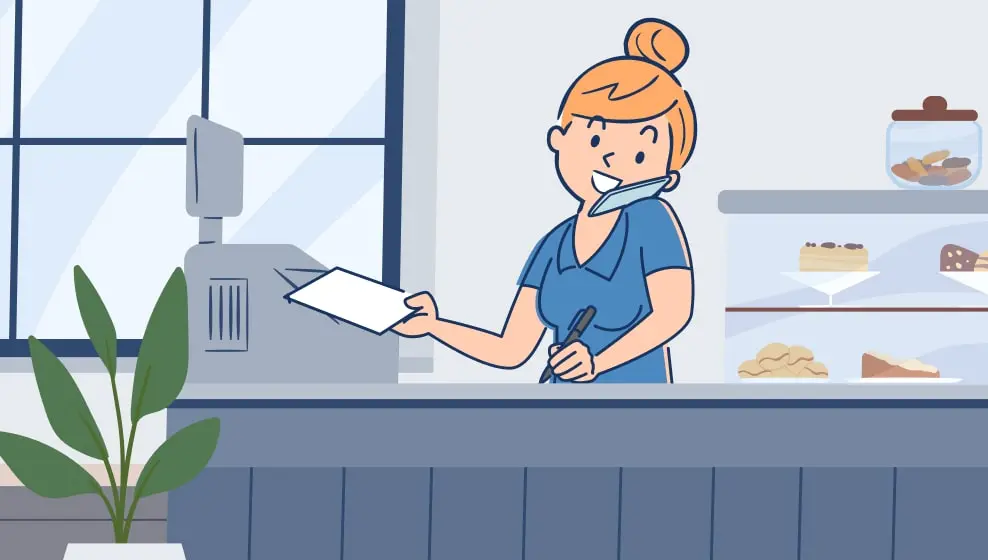A guide to income protection for self employed Australians
Being self employed often means having ups and downs in income. But what if an illness or accident left you unable to work at all?
Almost a quarter of Australian businesses say it will be difficult or very difficult to meet their financial commitments in the near future^. How long could you stay afloat if you couldn’t earn an income?
Income protection is one way to keep money coming into your bank account if something happens to you while working or elsewhere and you need time off.
It typically pays up to 70% of your average monthly income while you’re unable to work.
Our guide walks through the ins and outs of income protection for the self employed.
Key Points
Income protection can keep money coming into your bank account every month if you’re unable to work due to an illness or accident.
For self-employed people who don’t have access to sick leave or annual leave, income protection can be one of the only ways to keep the cash flowing if you can’t work.
Premiums for income protection are as little as a few dollars a day and generally 100% tax deductible.
What is income protection?
Income protection is a type of life insurance designed to replace a portion of your lost income if you’re unable to work due to illness or an accident.
It can help you pay the rent or mortgage and other bills, cover business expenses and generally keep up your normal standard of living while you’re recovering.
Income protection insurance pays up to 70% of your income in monthly instalments while you’re unable to work or until a cut off point called the benefit period.
Depending on the insurer, the benefit period usually ends after 1, 2 or 5 years or when you turn 65.
What is covered by income protection insurance?
Income protection covers a percentage of your income for a set period of time if you're unable to work due to an accident or an illness.
This means that ff you have an income protection policy and something happens to you while working, or during your time off, you'll still have cash coming in.
As we’ve mentioned, income protection only covers you for a certain benefit period, which could be 1, 2 or 5 years or up to the age of 65.
So, for example, if your benefit period is a year, you won’t be paid for longer than a year even if you still can’t work.
Total and permanent disability (TPD) insurance can help protect you if you’re unable to work ever again. You can read more about TPD here.
Why should you get income protection if you're self-employed or a sole trader?
Generally speaking, income protection isn’t compulsory, but there are a few good reasons why you might want to consider it if you’re self-employed.
Firstly, working for yourself means you generally don’t get paid sick leave or annual leave and aren’t entitled to workers’ compensation.
Secondly, if you have business expenses and personal debt like a mortgage, you’ll most likely still need to cover these even if you can’t work.
On top of that, there are some situations where income protection insurance is required to do certain types of work.
For example, if you’re a self-employed tradesperson, you might need an income protection policy before you can step onto a worksite. You can find out more about income protection for tradies here.
But possibly the most compelling reason to consider income protection is peace of mind.
How much does self employed income protection insurance cost?
How much income protection costs will depend on factors like your age, gender, smoking status and the type of work you do.
But most people only pay around a few dollars a day for their income protection policies.
That’s not much considering this type of cover can help keep your business running, pay your bills and remove the stress of not being able to earn money.
Prices and coverage do vary, so it’s worth shopping around to find a policy that offers the best value for money for your situation.
Working with our life insurance experts can help you find a policy that keeps your income protection premiums affordable while providing the level of cover you want.
Can self employed people get income protection in Australia?
Yes, generally you can get income protection if you’re self-employed as long as you work at least 20 hours a week and earn a minimum of $16,000 a year.
In most cases, you’ll also need to have been self-employed in the same occupation for at least two years.
COMPARE & SAVEWhat are the benefits of income protection policies for self-employment?
If you’re self-employed, needing time off unexpectedly can be more stressful than if you work for an employer. Your livelihood depends on being able to earn an income.
With that in mind, some of the biggest benefits of income protection include:
Money going into your bank account when you can’t work: If you’re too ill or injured to work, you can rest easy knowing you can pay the bills, buy groceries and generally keep up your normal standard of living while you recover.
Business expenses cover: If you are a small business owner, you can stay on top of business expenses even if you’re not earning an income. Some insurers offer specific cover for business expenses, including things like office rent, utilities and staff wages.
Tax benefits: The premiums you pay for income protection insurance are generally 100% tax-deductible.
Rehabilitation cover: Depending on your policy, you might be covered for additional expenses such as rehabilitation. That’s one less thing to worry about while you get back on your feet.
What does self employed income protection not cover?
Income protection will not cover all circumstances that prevent you from working.
For example, you wouldn't be able to make an income protection claim if you stopped working due to pregnancy or were made redundant.
You also won't be able to claim if it is proven that your injury was self-inflicted or suffered while doing something unsafe or illegal.
Is income protection insurance for self-employed people tax deductible in Australia?
Yes, if you obtain income protection insurance as a stand-alone policy, your premiums are generally tax-deductible.
Just a note: You can’t claim a tax deduction if your income protection insurance policy is taken out through your superannuation fund or if it pays you a capital sum to compensate you for your injury.
It’s always a good idea to check in with your tax specialist or accountant to confirm this with regard to your financial situation.
Is personal accident insurance the same as income protection?
Although there are some similarities, personal accident and income protection insurance aren’t the same.
Personal accident insurance only covers you for specific accidental injuries and potentially some illnesses, which are outlined in the insurer’s product disclosure statement (PDS).
Income protection generally covers you if you’re unable to work due to most accidents or illnesses.
An insurer can also cancel a personal accident insurance policy at any time. Income protection insurance can’t be cancelled once you have a policy, as long as you pay the premiums.
The benefit for personal accident insurance is typically paid as a lump sum. With income protection insurance, benefits are paid in monthly instalments similar to your income.
Why should self-employed Australians get covered by an income protection policy?
There’s no definitive answer here but basically, income protection can keep money coming in if you’re ever unable to work due to an illness or an accident.
That can be especially beneficial for self-employed people who rely on earning an income to pay the bills and don’t have access to sick leave, annual leave or workers’ compensation.
If an accident or illness would put your personal or business finances at stake, income protection insurance can give you peace of mind that you’re protected if something ever happens to you.
On top of that, you can generally get cover from as little as a few dollars a day.
Prices and coverage do vary though, so comparing multiple options is the best way to find a deal that’s right for you.
Our life insurance experts can help you compare income protection cover and prices from a panel of insurers.
Our insurance specialists know the ins and outs of income protection. Start comparing income protection insurance policies now by clicking the button below.
COMPARE & SAVEThis guide is opinion only and should not be taken as medical or financial advice. Check with a financial professional before making any decisions. ^ABS, Business Conditions and Sentiments, accessed 6 March 2022.



